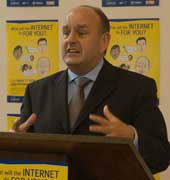 |
| Tough act to follow: ITV is finding it difficult to replace Charles Allen |
The board of ITV is giving a vivid demonstration of how difficult it can be to find a new chief when a powerful figure stands down. As candidate after candidate ducks out of the competition to succeed Charles Allen as chief executive, it becomes ever more embarrassing.
It was almost as bad at the Morrisons supermarket group when Sir Ken Morrison was being put under pressure to give up some control and bring in outsiders to strengthen the board. When a powerful leader has held the reins a long time it is a struggle to persuade him to let go — just as the Labour party is discovering with Tony Blair. It leaves the leader-in-waiting hovering anxiously in the wings.
The danger is that the successor will get fed up with hovering and reject the opportunity, just as seems to be happening at ITV.
Such failures can be expensive. A recent Investors in People survey concluded that £2 billion had been wiped off FTSE 350 shares because of poor succession planning.
At a large packaging company, a recently appointed CEO skidded off track after three months at an estimated cost of £3.5m, though when all the fees, compensation payments and opportunity costs were taken into account, the final bill was heading for £10m.
How do you keep talent if it cannot get promoted? This is the problem in many boardrooms.
“More and more organisations are coming to us asking what they can do as talent gets scarcer and harder to find,” said Andrew Rogerson, chief commercial officer of Hudson, the executive search specialist.
His message for companies that have left it late starting this quest is depressing. “The demographic time bomb was a popular topic in the l980s. But now it has gone off. In the last quarter for the first time in history there were more 60-year-olds than 16-year-olds in the workforce.
“Out of the UK population of more than 60 million, 35 million could be working, but only 27.8 million are. Of these 19 million are in the private sector and they have to sustain the other 41 million. There are just more jobs than people.
“People are more choosy now. Low-value manufacturing industry has disappeared. To keep a competitive edge you need more people with the latest skills.”
Rogerson’s colleague, Andrew McNeilis, said his first move would be to talk to the existing management team about whether potential leaders existed in the organisation. If they did not, the board would have to think about recruiting outside.
Succession planning is changing, he said. “Originally it was looked at from the top down with a narrow focus driven by the board, which believed that the new leader would come from inside. But it may mean turning to the external marketplace.”
Rogerson sees Hudson’s role as identifying and assessing the top talent. Not everyone is good enough or wants to become a chief executive. And this assessment can bring collateral damage. It risks identifying people that may not have a future in the organisation.
But some companies — GE is one — are happy to trim off the bottom management layer each year in a bid to keep it up to scratch.
McNeilis believes Tesco’s high-profile board members and the flexibility of its approach to planning gives it such an advantage that Morrisons will find it difficult to rise above being an also-ran. This is where good succession planning has its value. Used properly, it can help overcome frustration among leaders in waiting.
Rogerson and McNeilis believe that Britain’s workforce is not capitalising on its skills. “We are seeing migrant workers coming in who are highly qualified but are not doing highly qualified jobs. We have a record number of people working in low-paid jobs,” said Rogerson.
The answer to the scarcity of labour is to make sure that all talent is maximised. This is not something the government has been very good at.











